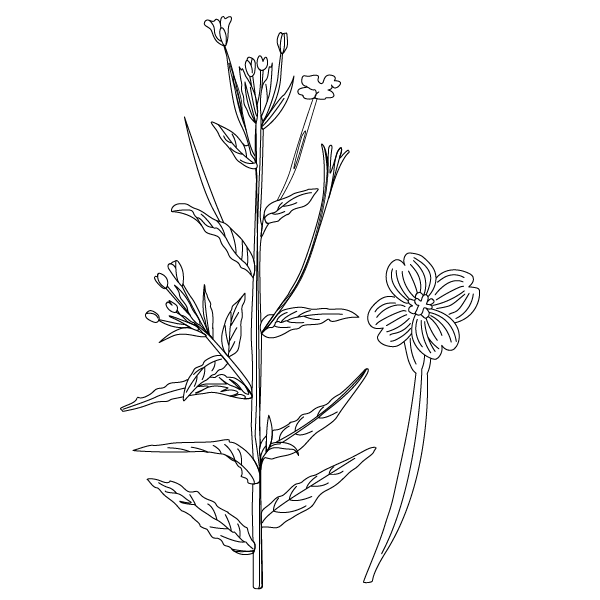
Botanical Name
Epilobium parviflorum
Also known as Small Flowered Willow Herb.
Renowned as an anti-inflammatory and astringent for prostate enlargement and urinary disorders.
Learn about Epilobium
Epilobium, commonly known as Willowherb or Small Flowered Willow Herb, is a perennial plant native to Europe which thrives in various regions worldwide, including North America. Similar to its close relative Fireweed (Epilobium angustifolium), which is indigenous to North America, both plants boast edible leaves that can be consumed raw or cooked, particularly when harvested at a tender age.
For hundreds of years, Epilobium has been used in traditional folk medicine for its anti-inflammatory, antibacterial, and astringent properties. It is used for a range of health concerns, such as prostate disorders, urinary infections, bladder and kidney issues and overall urinary tract health in both men and women. European herbalism, in particular, considers Epilobium as one of the primary herbs for managing benign prostatic hyperplasia (BPH) and various urinary tract problems, such as UTIs.
Beyond its urological benefits, Epilobium has been used to relieve digestive issues such as diarrhoea and inflammation of the digestive tract and to promote relaxation. As an antioxidant it can help protect against damage caused by free radicals.
Epilobium also finds its way into the realm of cosmetics, being incorporated into washes, creams, and shampoos due to its notable astringent properties. Making a simple wash or poultice with Epilobium can help ease skin irritations and help heal wounds. Alternatively, you can make an infused oil of Epilobium for topical applications.
For internal use, Epilobium is commonly consumed as a tea or tincture.
Common Uses
Anti-Ageing, Antioxidant, Arthritis, Dermatitis, Diarrhoea, Digestion, Digestive Complaints, Gastrointestinal Disorders, Heavy Menstruation, Inflammation, Kidney Infections, Male Reproductive Health, Prostatitis, Skin Conditions, Skin Health, Urinary Incontinence, Wound Healing, and Urinary Tract Infections.Herbal Actions
Anti-Inflammatory, Antioxidant, Astringent, Urinary Antiseptic, Tonic, and Antibacterial.
References
References
Epilobium, commonly known as Willowherb or Small Flowered Willow Herb, is a perennial plant native to Europe which thrives in various regions worldwide, including North America. Similar to its close relative Fireweed (Epilobium angustifolium), which is indigenous to North America, both plants boast edible leaves that can be consumed raw or cooked, particularly when harvested at a tender age.
For hundreds of years, Epilobium has been used in traditional folk medicine for its anti-inflammatory, antibacterial, and astringent properties. It is used for a range of health concerns, such as prostate disorders, urinary infections, bladder and kidney issues and overall urinary tract health in both men and women. European herbalism, in particular, considers Epilobium as one of the primary herbs for managing benign prostatic hyperplasia (BPH) and various urinary tract problems, such as UTIs.
Beyond its urological benefits, Epilobium has been used to relieve digestive issues such as diarrhoea and inflammation of the digestive tract and to promote relaxation. As an antioxidant it can help protect against damage caused by free radicals.
Epilobium also finds its way into the realm of cosmetics, being incorporated into washes, creams, and shampoos due to its notable astringent properties. Making a simple wash or poultice with Epilobium can help ease skin irritations and help heal wounds. Alternatively, you can make an infused oil of Epilobium for topical applications.













